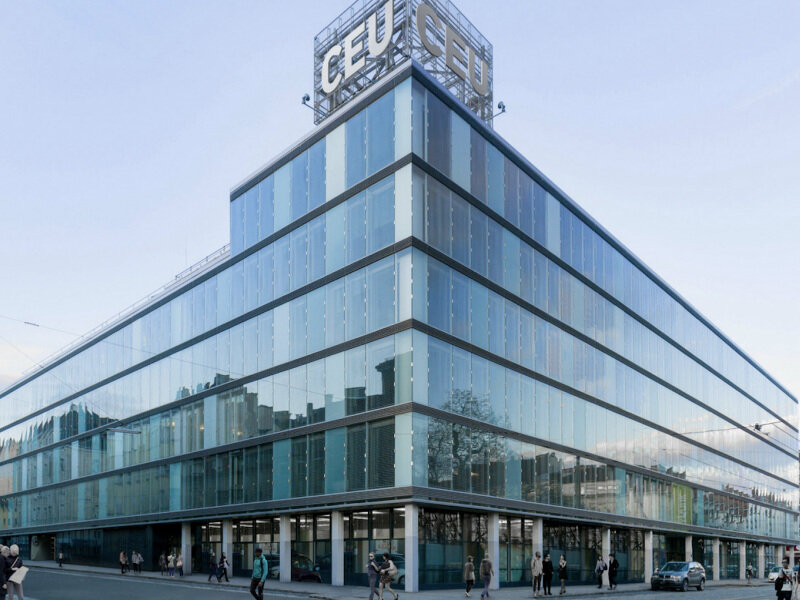Four Things to Know About That $1 Billion Soros Bet on Global Liberal Arts Education
/Central European University in Vienna. It’s working with Bard College and other partners to build OSUN.
How do you cap a lifetime dedicated to supporting democratic ideals around the world—inclusive societies, free expression, government accountability, and respect for human rights and the rule of law?
If you’re George Soros—and you’re still worth $8 billion, even after giving away $32 billion—the answer is creating an international educational collaboration that gives students the benefits of a liberal arts education and equips them with the values and critical thinking skills they’ll need to defend the free and open societies of the future.
When announcing his $1 billion commitment to the Open Society University Network (OSUN) in January, Soros, now 89, called the initiative the most important of his life. That’s saying something, considering he spent those years emigrating to the U.S. from communist Hungary, rising to the top of the hedge fund industry, and founding Open Society Foundations (OSF), a philanthropic network that operates in more than 120 countries.
Here are four things to know as the initiative grows:
1. Coming Full Circle
The initiative aligns with Soros’ earliest philanthropic efforts, which got off the ground in 1979 with scholarships for black students living under apartheid in South Africa. An academic exchange program to share ideas and ideals between the West and communist Hungary followed in the early '80s.
Since then, OSF has funded more than 20,000 scholarships for young people studying in the U.S. and Europe, and continues to support educational opportunities for refugees and high-potential candidates whose studies may otherwise be constrained by politics, conflict or prejudice. It also stands behind broader efforts to support the development of institutions of higher learning that are inclusive, well-governed, and promote academic freedom, like its work helping to establish the University of Central Asia in Kyrgyzstan.
2. Growing a Network
OSUN’s two core educational partners are Bard, a liberal arts college located 90 miles upriver from New York City, and Central European University (CEU), now headquartered in Vienna, which was founded by Soros after the fall of the Berlin Wall. They will partner with Arizona State University, a leader in distance learning, and other institutions around the globe, including BRAC University in Bangladesh. The initiative will be led by Leon Botstein, Bard’s president, and a longtime member of OSF’s Global Board.
OSUN expects to collaborate with educational institutions that offer a rigorous education and have global expansion plans. OSF Vice President Leonard Bernardo says the initiative has already drawn partners like SOAS University of London, Sciences Po in Paris and Ashesi in Africa. He predicts that future networks will grow around the initiative’s thematic work.
3. A Decentralized Approach
OSUN will offer “integrated teaching and research across higher education” globally, and plans to bring students and faculty together regularly, both virtually and in-person. Participating institutions will have complete control over the pursuits they wish to advance within OSUN’s mission to open intellectual inquiry, help students get to know other societies from the inside, build advanced reasoning skills, and promote global research collaboration.
Rather than thinking about OSUN as a university collaboratively conferring degrees, Bernardo says the best way to view it is as a network of relational activities that “fashions its work” around areas like climate, refugees and migration, and student mobility. The first conferring will be a 5-year bachelors and master’s degree in human rights development. Additional concentrations are expected to grow from there.
4. Donor Partnerships
Soros understands the limits of any one funder or institution, and welcomes the contributions of other philanthropists, saying, “We can’t build a global network on our own.” Specifically, OSF is looking for “farsighted partner institutions who feel a responsibility for the future of our civilization, people who are inspired by the goals of OSUN and want to participate in its realization.”
Bernardo reports that OSF is already speaking with a number of donors, and fully expects considerable support from others in the coming months and years.
After sounding the alarm on the rising headwinds of authoritarianism and climate change at the World Economic Forum in Davos, Soros said he believes the best hope for the future “lies in access to an education that reinforces the autonomy of the individual by cultivating critical thinking and emphasizing academic freedom.” He continued by saying he considers OSUN “to be the most important and enduring project” he’s ever launched, one he’d like to see realized during his lifetime.



















